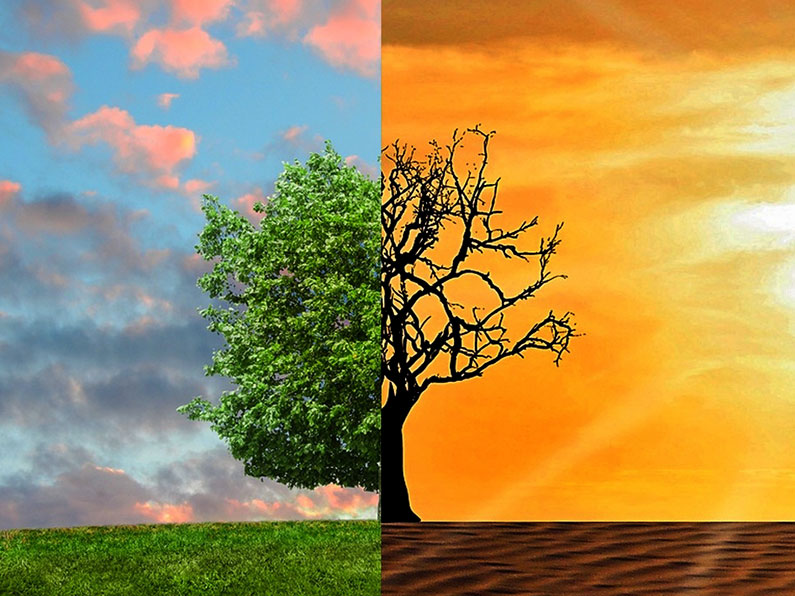The Thomas Poole Library Wednesday, January 11th 2023, 7.30 pm
The Science of Climate Change – talk by Terry Abbiss
The talk was well attended in spite of the atrocious weather. We were pleased to be welcomed with a warming cup of tea on arrival.
Terry has had a varied career working as an analytical chemist; for much of his working life, he worked as an environmental chemist.
He thanked Sian Stafford, the Library’s Events Manager, for preparing the PowerPoint presentation. He started his talk by illustrating what is meant by the “greenhouse effect”. The Earth is, in effect, a “greenhouse planet” where energy is retained by the atmosphere rather than by glass.
“Climate” is different from “Weather” in that Climate happens year on year, whereas weather is a day on day.
Studies on the atmosphere started with Fourier in 1827, who realised that the Earth was much warmer than it should be. He calculated it was +15 degrees when it should be minus 15 degrees, but he had no idea why. Tyndall carried out further investigations in 1859 and found that water vapour, CO2 and methane absorbed nearly all infrared rays from the Sun – he had, in effect, found “greenhouse gas”. It was actually a woman by the name of Eunice Foot in 1856 who discovered this first, but she published her findings in a very obscure journal! She observed that concentrations of CO2 in the air could affect global temperatures.
Burning all fuels releases CO2 into the atmosphere – in effect, it is “bottled sunshine”. Burning wood releases CO2, which was captured during modern times (the previous 200 years). However, burning fossil fuels releases, CO2 captured 30 to 60 million years ago! Fossil fuels such as coal, gas, oil, burning tropical rain forests and energy released from some volcanoes produce CO2, which stays in the atmosphere for 1,000 years.
Global records demonstrate a new dramatic weather event every 13.5 years. 2022 will probably be found to be the hottest year ever recorded. The hundred years between 1880 and 1980 showed an average global temperature increase of 0.08 degrees C per decade. Between 1981 and 2020, global temperatures have risen by 0.18 degrees C per decade. This has now reduced to every three years, i.e. the highest temperature, greatest windspeed, and highest rainfall.
On July 19th 2022, the UK recorded its highest-ever daytime temperature of 40.3 degrees (previous record 38.7).
It is generally considered that global temperatures started rising with the Industrial Revolution (1780 onwards) with the steady increase in the use of fossil fuels. A more rapid increase was shown after 1950 with the greater use of oil. CO2 levels do rise and fall naturally but have never approached the levels we have in the present day. We know this because of the work of Charles David Keeley, who set up infrared gas analysers in various places. These demonstrated the Keeling Curve. In 1950 CO2 was found in concentrations of 310 ppm. In 2022 this had increased to 419ppm.
Various studies can prove the increase in CO2, including studies of ice from great depths in the Antarctic. In interglacial periods CO2 existed at 200 to 280ppm. In 2013 for the first time, CO2 levels exceeded 400 ppm.
Methane is also a powerful greenhouse gas – 80 times more potent than CO2, but it is removed from the atmosphere over 20 years as opposed to around 1000 years for CO2. Terry said we could well be breathing in carbon dioxide exhaled by the Normans! Methane is responsible for about 25% of the current greenhouse effect. Methane is released through the thawing of the permafrost, fracking, landfill and agriculture.
Other gases involved in the greenhouse effect are Nitrogen Oxides which are produced by diesel engines, lighting and fertilisers.
The Earth’s current atmosphere’s greenhouse gases consist of 84% Carbon Dioxide, Methane 10%; Nitrogen oxide 4% and fluorinated gases 2% (used in old fridges). The latter has been phased out but is still around.
Terry finished by saying the Earth is getting hotter and Climate Change is real. He invited questions from the floor, and a lively question-and-answer session ensued.
Roger Stacey thanked Terry for his very detailed insight into the science and the audience for their pertinent questions.

